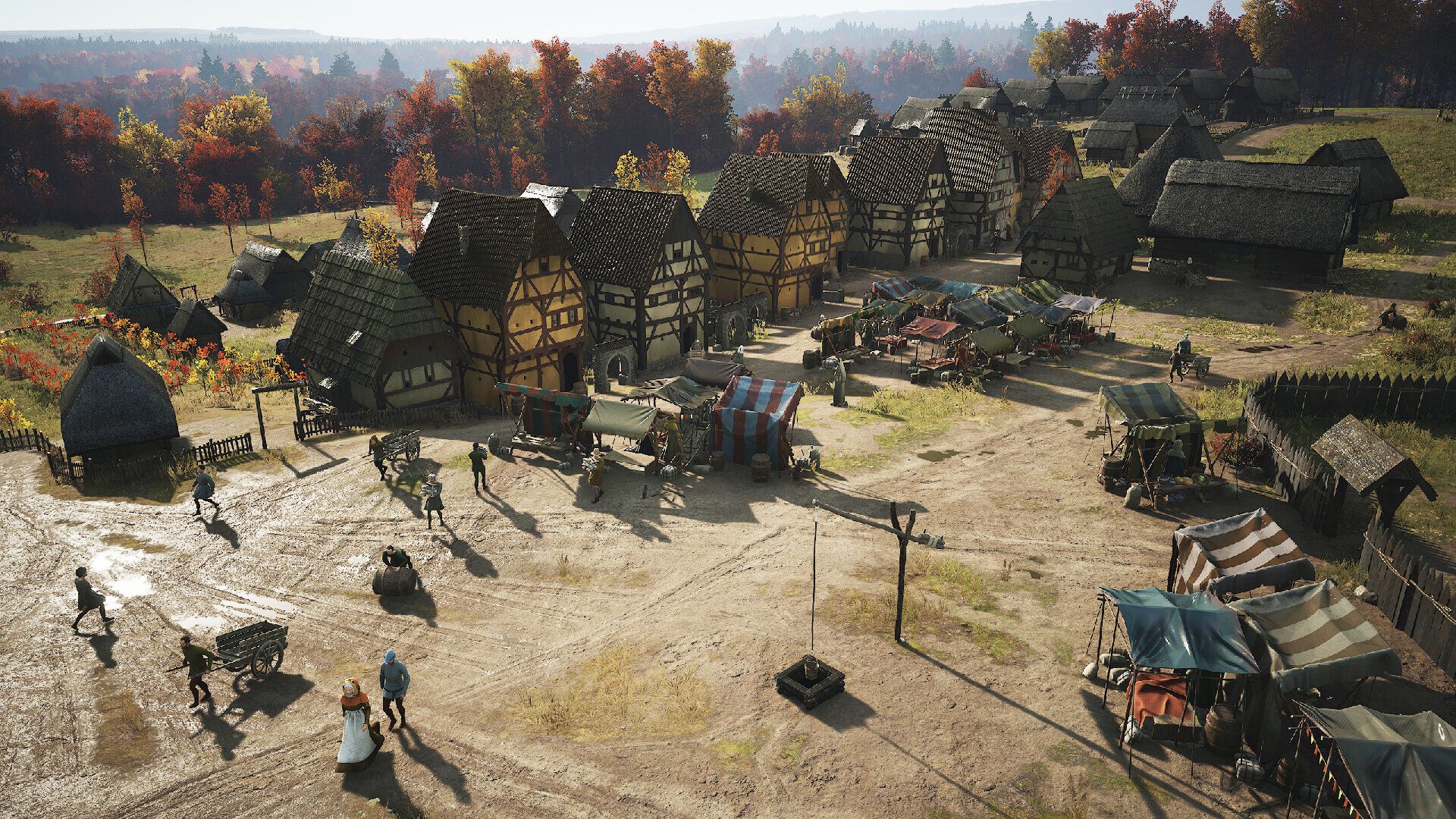
From bees to bloomeries to bandits, I'm trying to get rich quick.
Playing a survival city builder is like a juggling act, except when you drop a ball 75 people starve to death. Everything needs to be carefully balanced. The population needs to steadily grow to provide more bodies for labor—but not grow so quickly that you wind up with too many mouths to feed. When citizens ascend to a higher status they can be taxed more, but they also require more amenities to be kept happy.
Even something as simple as a tree can require the careful weighing of options: should it be made into planks for a new building, or used to make furniture to sell at market, or turned into firewood since winter is approaching? It sounds weird, but lives could depend on the choice you make with that one tree.
Unfortunately for thousands of tiny citizens in numerous survival city builders I’ve played over the years, I’m not great at keeping a lot of balls in the air. My usual strategy, then, is to focus on one big ball: I build and manage my city with the goal of massively over-producing a single product or resource, then sell 100% of that resource to traders and use the money to buy all the other balls (food, clothes, livestock, etc.) I need to keep my people alive.
My mayoral election slogan could be: “I’m a one-trick pony, without the actual pony, unless my trick is specifically about mass-producing ponies, in which case there will be quite a lot of ponies.” Wow, that’s terrible. It’s probably a good thing I don’t to be elected, since I’m a lord.
Mass market
(Image credit: Slavic Magic)
My “one big ball” strategy has mostly worked in the past. In Patron I made my city generate and sell thousands of cherry-flavored cookies, and I was so strict that my villagers were not allowed to eat those cookies, or even a single cherry, themselves. In Farthest Frontier I realized that bee farming didn’t require a dedicated worker like every other industry, so I put all my chips into bees. I built so many apiaries my citizens got stung pretty regularly even if they weren’t harvesting the hives themselves, and I made a fortune exporting beeswax candles (until my treasury was heisted by bandits).
In the early hours of Manor Lords, when I’m once again struggling to balance my labor needs with my food shortages and trying to export just enough so I can afford to import a little more, I feel that familiar urge to stop juggling and start cheesing. I don’t have a dairy farm to produce actual cheese, so I go with my old standby: bees.
Yes, Manor Lords has bees, but as I prepare to go absolutely ham on beehives, I notice something. Manor Lords won’t let me go bee crazy:
(Image credit: Slavic Magic)
If the text is too small to read, that’s what you see when you go to unlock beekeeping in Manor Lords. Each region can sustain only 2 apiaries, and if you build more they won’t result in more honey. Beekeeping has been pre-nerfed, almost as if developer Slavic Magic wants you to have a more realistic experience instead of just clicking the “build apiary” button 50 times and winding up rich. I, for one, am incensed.
Sure, you could probably still become a bee baron—you can conquer and colonize other areas of the map in Manor Lords, so if you took over all eight regions and built a total of 16 apiaries, you’d probably make mad paper from selling all that honey. But if you have enough power and wealth to take over the entire map, you probably don’t need to get a doctorate in bee-squeezing. (I assume that is how you get honey out of a bee.)
Hard hats
(Image credit: Slavic Magic)
OK, fine. There must be other ways to specialize my city. We learned last week that infinite sheep farming has already been patched out, which is a damn shame. I consider leather, briefly, because not only do my hunters gather meat, they harvest hides—the very thing animals carry their meat around in. And nicely, I can have my citizens produce leather passively from their homes. In Manor Lords, villagers’ houses, called burgages, can be assigned an extension for families to work when they’re at home. It’s like having an additional workshop in every single backyard. Chicken coops can produce eggs, gardens can grow vegetables, and goats can be turned into leather.
With villagers generating leather and selling it to each other at market, I can trade all of my hunter’s leather for gold. Time to build as many hunting camps as I can afford.
There are only three friggin’ animals remaining in the whole forest?
Except, no, that’s not gonna work either, because I notice the animal population in my region has dwindled down to… three? There are only three friggin’ animals remaining in the whole forest? Oh, right, that’s also my fault because I didn’t get my crops planted in time for winter so I told my hunters to essentially exterminate anything with four legs, even at risk of completely depopulating the forest.
With leather futures suddenly looking bleak, I strike on a better idea: helmets. Helmets sell for a little more than other military items at the trading post, and if I assign several (as in all) of my burgages to craft helmets I should be able to flood the market. There’s one teeny tiny little snag—I have to create an entire ore mining and blooming industry to produce iron slabs in my city first—but once I’ve done that the helmet bucks will surely come flooding in. Right?
Paid to raid
(Image credit: Slavic Magic)
The helmet industry almost immediately fails.
Getting the iron ore flowing is a problem: first I need to reassign workers from other jobs to build and staff the mine, and then more to build and staff the bloomery. Sure, I have a couple unemployed hunters now, but if I really want to get my helmet startup off the ground I need to pull some timber workers out of the forest, too. That leads to a wood shortage.
I simply can’t go all in on my Etsy helmet shop.
Without being able to build new homes my town won’t attract new families that I can immediately force to work in my new iron industry, plus my bloomery furnace won’t function without wood to burn. Also, y’know, a lack of firewood will mean everyone dies of cold this winter. This is all suspiciously starting to feel like juggling again, but I simply can’t go all in on my Etsy helmet shop, at least not yet.
(Image credit: Slavic Magic)
More irritating is that my food storage stockpile keeps getting pilfered by bandits who live in a camp in another region. They don’t often get away with much—one time they stole a total of three eggs—but it happens often enough to piss me off, so I take a handful of my farmers and woodsmen and iron workers and inform them that they’re now an elite death squad. They grab the small handful of weapons and pretty adequate supply of helmets I have lying around, and I send them marching off to kill some bandits.
Happily, the bandit camp has been abandoned, perhaps because the legendary Three Egg Heist set them up for life, but I still make a load of money from pillaging their tents. It’s enough money to disband my unit, order them back to their dreary lives, and hire a group of brigands. That’s right, I’m now paying brigands to kill other brigands, a strategy I most recently used in medieval strategy sim Norland.
(Image credit: Slavic Magic)
And it works great! I find the new bandit camp and there’s a long and bloody clash between my mercs and those miserable egg-stealing bastards, and my guys win. In what feels like a pretty unlikely event, the murderous thugs I hired immediately deposit all of their plundered coins into my bank account. I fire them immediately so I don’t have to pay them more wages, then hire a different group of mercs in a different region, and send them to raid another bandit camp. Again, I score a big cash payment, and fire the mercs before I owe them another round of wages.
Instead of candles or cookies, my resource is brutally murdered bandits.
Wait a minute. Did my dream of cheesing this survival city builder just rise from the ashes? I’m focusing on a single product to the exclusion of all else to make money. Instead of candles or cookies, my product is brutally murdered bandits, but when it comes to my bank ledger there’s really no difference. Profit!
But it’s not a foolproof strategy. The money in my treasury doesn’t contribute to my city’s regional wealth, which is needed to expand burgages and purchase more livestock, so it’s not really helping me grow. There’s also not an infinite supply of bandit camps: new ones only appear once in a while, putting a limit on my new income stream.
(Image credit: Slavic Magic)
And not having a proper civilian military means that if you’re raided by brigands and the only mercs available to hire are in a completely different region, they might get there just a little too late to help out and the invaders will set your town almost completely on fire, and burn down more than half your buildings, and kill a bunch of people, and steal most of your stuff. That’s another little flaw.
So, I’m back where I started. It looks like I can’t cheese my way through this one—I’m gonna have to buckle down and actually become a competent lord after all. Manor Lords is out Friday in early access on Steam, if you want to give it a try yourself.






